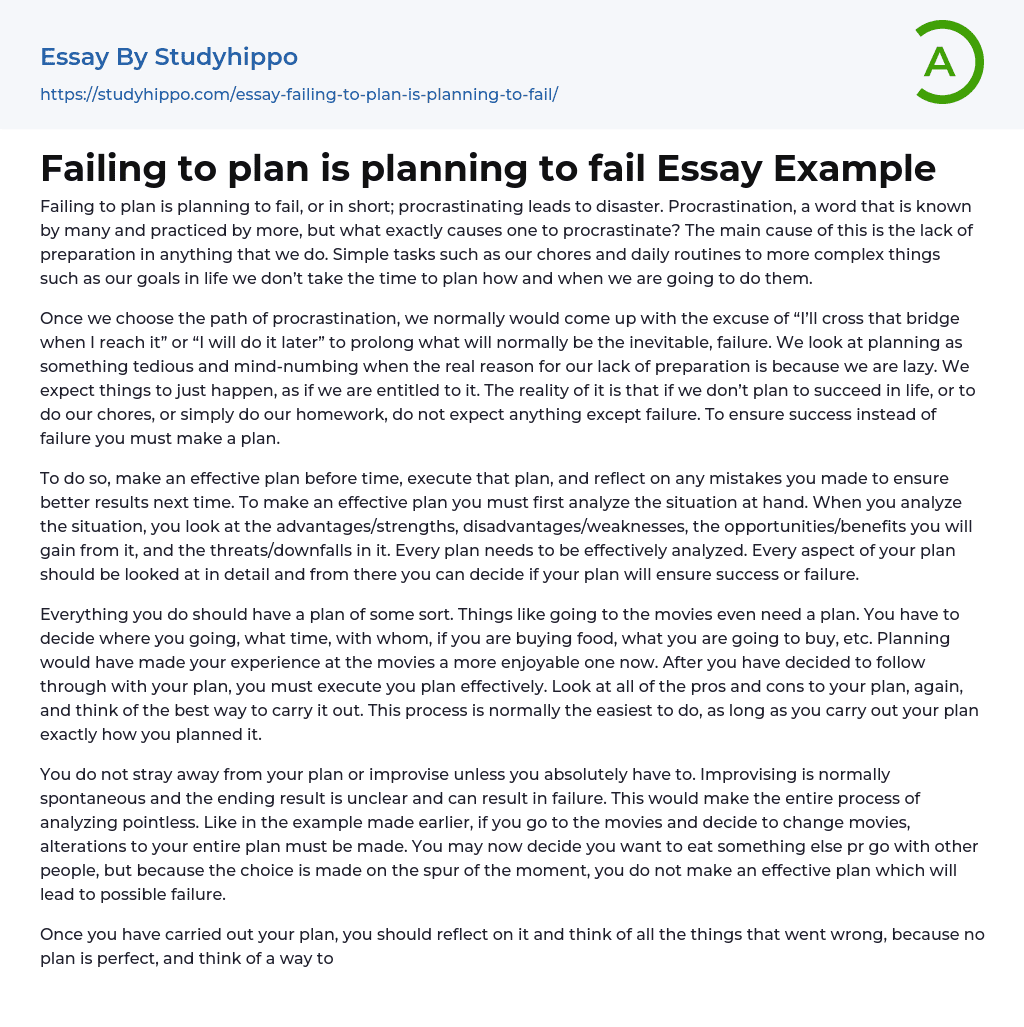Failing to plan is planning to fail, or in short; procrastinating leads to disaster. Procrastination, a word that is known by many and practiced by more, but what exactly causes one to procrastinate? The main cause of this is the lack of preparation in anything that we do. Simple tasks such as our chores and daily routines to more complex things such as our goals in life we don’t take the time to plan how and when we are going to do them.
Once we choose the path of procrastination, we normally would come up with the excuse of “I’ll cross that bridge when I reach it” or “I will do it later” to prolong what will normally be the inevitable, failure. We look at planning as something tedious and mind-numbing when the real reason
...for our lack of preparation is because we are lazy. We expect things to just happen, as if we are entitled to it. The reality of it is that if we don’t plan to succeed in life, or to do our chores, or simply do our homework, do not expect anything except failure. To ensure success instead of failure you must make a plan.
To do so, make an effective plan before time, execute that plan, and reflect on any mistakes you made to ensure better results next time. To make an effective plan you must first analyze the situation at hand. When you analyze the situation, you look at the advantages/strengths, disadvantages/weaknesses, the opportunities/benefits you will gain from it, and the threats/downfalls in it. Every plan needs to be effectively analyzed. Every aspect of you
plan should be looked at in detail and from there you can decide if your plan will ensure success or failure.
Everything you do should have a plan of some sort. Things like going to the movies even need a plan. You have to decide where you going, what time, with whom, if you are buying food, what you are going to buy, etc. Planning would have made your experience at the movies a more enjoyable one now. After you have decided to follow through with your plan, you must execute you plan effectively. Look at all of the pros and cons to your plan, again, and think of the best way to carry it out. This process is normally the easiest to do, as long as you carry out your plan exactly how you planned it.
You do not stray away from your plan or improvise unless you absolutely have to. Improvising is normally spontaneous and the ending result is unclear and can result in failure. This would make the entire process of analyzing pointless. Like in the example made earlier, if you go to the movies and decide to change movies, alterations to your entire plan must be made. You may now decide you want to eat something else pr go with other people, but because the choice is made on the spur of the moment, you do not make an effective plan which will lead to possible failure.
Once you have carried out your plan, you should reflect on it and think of all the things that went wrong, because no plan is perfect, and think of a way
to improve for next time. Look at all of the negative aspects and think of how you can improve on it, make it better, and execute more effectively next time. Again, using the previous example, your trip to the movies may not have been perfect. There would have been some things that you would have upset at the movies, whether it had been the cold a/c or the stale food, there would have been something.
You would now look back at your experience and plan it out better for a more enjoyable time. As mentioned earlier, failing to plan is planning to fail. To succeed in life, you must know how to create effective plans and be able to carry them out. Nothi8ng in life comes easy. You must have a plan for almost anything that you do, that is if you want to be successful. Getting material things such as a luxurious house, a beautiful car or even an enjoyable time at the movies all happens as a result of careful planning.
- Age Of Enlightenment essays
- Ethos essays
- Time essays
- Acceptance essays
- Meaning Of Life essays
- Reality essays
- Natural Law essays
- Political Philosophy essays
- Utilitarianism essays
- Existence essays
- Free Will essays
- Good And Evil essays
- Confucianism essays
- Relativism essays
- Conscience essays
- Environmentalism essays
- Empiricism essays
- Epistemology essays
- Ethics essays
- Existentialism essays
- Human Nature essays
- Individualism essays
- Metaphysics essays
- Philosophy Of Life essays
- Transcendentalism essays
- Truth essays
- Destiny essays
- Determinism essays
- Fate essays
- Functionalism essays
- Philosophers essays
- Pragmatism essays
- Future essays
- Child Observation essays
- Critical Reflection essays
- Teaching Philosophy essays
- Personal Philosophy essays
- Action Speak Louder Than Words essays
- Can Money Buy Happiness essays
- Values of Life essays
- Ethical dilemma essays
- Normative Ethics essays
- Virtue Ethics essays
- Belief essays
- Deontology essays
- Moral essays
- Virtue essays
- Work Ethic essays
- Henry David Thoreau essays
- Carl Jung essays




